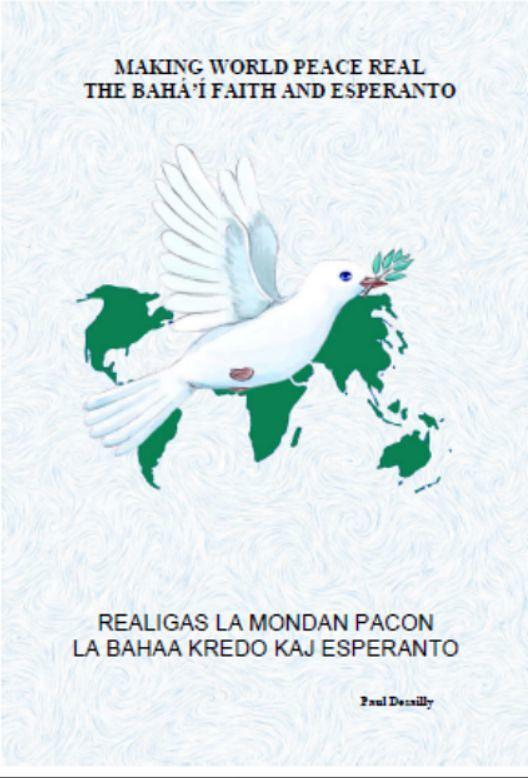PRESIDENTS TRUMP AND XI: TRADE OFF ON CORPORATE ENGLISH
Addressing nine hundred Esperantists from thirty countries, Doctor Ludoviko Lazaro Zamenhof in Geneva 1906, adumbrated the internal idea of his 19-year-old international auxiliary language: ‘We are all very conscious that in working for Esperanto we are driven not by the idea of practical use, but only by the thought of the sacred and important idea that an international language carries in itself. That idea — you all feel it very strongly — is brotherhood and justice among peoples.’ (Translated by Trevor Steele, Adelaide, Australia.)
Commerce and justice may coexist! The commercial possibilities of Esperanto become self-evident once the need of an international auxiliary language (auxlang) is apprehended. Its euphony in verse, especially at the pinnacle of classical poetry, as with its flexibility vis-à-vis sharing humorous stories, are all well chronicled. http://aea.esperanto.org.au/ftp-uploads/ESK-127-jun2017.pdf (pages 24-26) http://aea.esperanto.org.au/ftp-uploads/ESK-126-mar2017.pdf (pages 19-22.) Why then in abundance are those who ignore (a) the human rights dimensions of the principle of a universal auxiliary language that per se seeks not to usurp the just role of national languages and who (b) deride its inherent usefulness for protecting minority languages and who (c) fail to consult on it as “the means of the progress and development of all races”, to cite Sir Abdul Baha’s wise words voiced in Washington D.C. in 1912?
Of my five trips to Japan and many more through thirty cities in China and then across the Yalu to North Korea, to Mongolia (Inner and Outer), India, Nepal, Israel, Iran and on foot to Vietnam and Turkey well-armed by means of Dr. Zamenhof’s language of world peace, one goal aims at improving relations between Asian countries subjugated at one time or another by Europeans. That young Asian activists often communicate today haltingly and paradoxically in the mother tongue of former imperialists is a problem that the politically non-partisan and religiously neutral Esperanto movement can solve globally within months.
United Nations pleads for language justice and celebrates International Mother Language Day:
https://www.un.org/en/observances/mother-language-day
http://www.linguistic-rights.org/21-02-2020/GEP_LINGV_2020_EN.jpg
The impact of Corona virus: https://www.languageonthemove.com/coronavirus-meets-linguistic-diversity/
https://www.languageonthemove.com/what-does-the-post-covid-19-future-hold-for-confucius-institutes/
The oneness of the human family: https://bahaiteachings.org/an-undeniable-truth-we-are-one/
In Tianjin University of
Commerce 2 decades ago, 2 journalists inquired about my 2 Esperanto courses. To this day they form part of an Esperanto team of ten employees of China Radio International, an organ of the state. Intrigued by Esperanto’s impact on my busy students and colleagues they aired a fine program featuring Chinese and Japanese Esperanto beginners who happily intermingled on campus without experiencing Sino-Japanese estrangement that often occurs in China because of World War 2. Alas, even today, many citizens of those two powerful and populous nations remain incommunicado because of political events 75 years ago or
because the English language is unacceptable or too difficult.
In South Korea, Japan and China, a fruitful triangle of Esperanto countries, where for a decade until 2007 my career revolved around the teaching of English, I rarely heard a complaint, and never from the locals, that Esperanto’s eurocentrism alienates Asians or is too difficult for them. Though voiced in an egalitarian mindset, that erroneous view is occasionally blurted out in China by monolingual English teachers from the UK and USA. When visiting Japan, where English-language tuition remains obligatory despite decades of dismal outcomes, the visitor at once realizes that the language of Shakespeare is a fiasco for all save a few gifted young linguists. A similar circumstance prevails long term in China as the business of teaching English goes from strength to strength. Every academic year 99.9% of the victims (i.e. English majors; pardon my Freudian slip!) successfully pass all exams, graduating with elan and pride irrespective of their spoken English level, much to the satisfaction of their unaware parents whose remittances paid my hefty salary. An absurd situation prevails in which more and more private universities, along with the Chinese government, feature as protagonists in this expensive charade. Not one graduate in ten attains conversational fluency despite countless hours swatting over the 'diabolical' English language. When will the Communist Party of China in its negotiations with President Trump ask him to balance matters of trade by reckoning America’s language bonanza: China’s enormous expenditures for attracting English teachers to her shores and for sending a zillion youngsters to America’s cash cow colleges (if WHO permits!) to gain a suboptimal education in a language that’s beyond most of them amounts to the biggest failure to negotiate a fair deal that monolingual President Trump could ever hope for! On the other hand, teaching Esperanto is many times more rewarding and comparatively easy, for students and teachers alike!
https://blogs.bl.uk/european/2017/07/esperanto-as-an-asian-language.html
FDR, Woodrow Wilson, Barack Obama etc: https://en.wikipedia.org/wiki/List_of_multilingual_presidents_of_the_United_States
President D. Trump: https://www.elitedaily.com/p/does-donald-trump-speak-any-other-languages-he-has-1-clear-favorite-18691739
Mahatma Gandhi: “To give millions a knowledge of English is to enslave them.” https://www.mkgandhi.org/towrds_edu/chap02.htm
See number 9: https://zamenhof.info/en/citajxoj
Because Germany and Japan are very wealthy countries, and India’s economy is rapidly growing and Portuguese and Spanish and Bahasa and Swahili are popular languages, the number of official languages at the United Nations might or should, sooner or later, reach eight or ten or a baker’s dozen. Because administrative costs for adding languages there become exponentially exorbitant, thus hindering expenditures on urgent humanitarian needs, let’s hope for the sake of all kids rich and poor that the next UN-language actually solves the global language problem by adding in prudent stages a non-sexist, non-racist, easily learned universal auxiliary language devoid of imperial, political and religious baggage.









